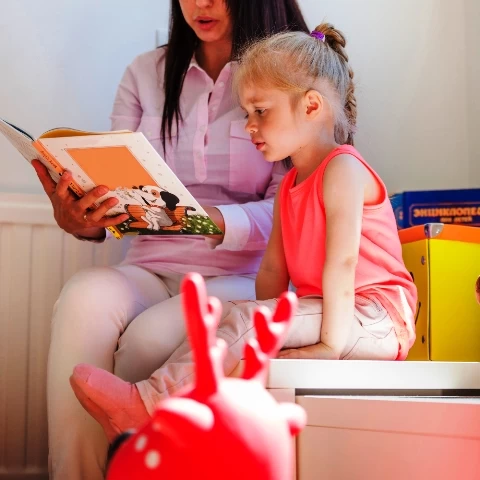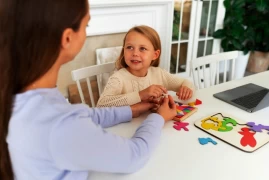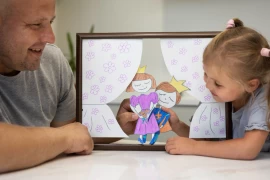
Early Childhood Development and Sensory Play
- Early Childhood Development and Sensory Play
- Early Childhood Development
- Sensory Play
- Ali Dede Academy Kidsnook Samsun Station's 'Sensory Storytime' Program: What is the Early Childhood Development Support Program, and What are its Achievements?
When a child is in the early stages of development, it is crucial to stimulate each of their sensory systems. This way, different senses integrate with each other, forming a complete sensory system.
Early Childhood Development
The period a child spends from 0 to 6 years is vital for their development. In recent years, it has been suggested that considering this period as 0-8 years might be more accurate. Termed as "early childhood development," during this phase, a child, ready to learn many things, develops rapidly.
The child's intelligence, perception, personality, social behaviors, and cognitive abilities significantly shape during this period. The majority of brain development is also completed during this time. Considering its impact on later years, the importance of this period in the child's neurological, biological, and psychosocial development becomes evident.
Studies show that 50% of mental development up to the age of 17 occurs by the age of 4, and an additional 30% occurs between the ages of 4 and 8. Also, 33% of school achievements shown until the age of 18 are attributed to the education received from 0-6 years (Tekiner, 1996, p.10). This means that an individual's personality, characteristics, and habits are shaped by behaviors and experiences acquired during childhood. A child who doesn't achieve necessary development in early childhood may face lasting negative effects in cognitive, emotional, and social aspects.
From a neurological perspective, touch is a crucial supporter of development. Children raised without physical contact may experience a slowdown or even cessation of neurological development. Unused connections in the brain that are not stimulated during this period weaken and disappear over time.
The environment in which a child grows and the education they receive until the age of 6 greatly influence this situation. The foundation of language skills, crucial for social and academic life continuity, is laid during this period.
Before children start speaking, the brain's language development regions become actively engaged. The process of breaking down language into meaningful parts in the brain occurs through interactions with adults. Therefore, the speech of the child's family and immediate surroundings holds great importance for the child's developmental process.
Children's extended presence in the education system contributes to their becoming more research-oriented, curious, entrepreneurial, healthy, active, and productive, leading to academic success. All of these depend on a productive and high-quality early childhood development period.

Sensory Play
The importance of sensory play in early childhood can be examined from various perspectives:
- Sensory Perception Development: Sensory games help children enhance their sensory perception. For example, their ability to perceive colors, textures, and smells increases through these games.
- Motor Skills Development: Sensory play contributes to the development of children's motor skills. Particularly, fine motor skills, hand-eye coordination, and muscle control are strengthened through these games.
- Language Development: Sensory play encourages children's language development. Children find opportunities to express and share their sensory experiences using language.
- Learning and Exploration: These games allow children to explore their surroundings and learn. Sensory experiences help children develop conceptual understanding.
- Emotional Development: Sensory play supports children's emotional development. During play, children experience and express their emotions and relationships.
Children who engage in sensory play during early childhood acquire several important benefits:
- Sensory Awareness: Children become more aware of their sensory experiences and develop the ability to respond to their surroundings more attentively.
- Social Skills: Sensory play enhances children's interaction and collaboration skills with others.
- Interest in Learning: These activities increase children's interest in learning and positively influence their learning processes.
- Problem-Solving Skills: Sensory play helps develop children's problem-solving and critical thinking skills.
- Language Development: Children use words to express their sensory experiences, thereby enhancing their language skills.
Ali Dede Academy Kidsnook Samsun Station's 'Sensory Storytime' Program: What is the Early Childhood Development Support Program, and What are its Achievements?
The Sensory Storytime program is inspired by the structural education system and alternative education systems such as Reggio Emilia, Montessori, and Waldorf. It is designed to instill a love for listening to stories and narratives in children from early childhood, enhance their thinking and planning abilities, promote entrepreneurship and motivation, and increase a child's interest in school and learning through its methods and techniques.
Implemented correctly, the Sensory Storytime program increases the level of success compared to traditional practices. The program focuses on a variety of methods and problem-solving based learning, where the learning processes experienced by students are more important than the results. The role of the instructor in Sensory Storytime is to make each child actively involved in their learning process. The natural curiosity of students is supported, and the methods and techniques used aim to help children relate existing knowledge to new information.
The instructor prepares the necessary materials and environment for implementing the program. They act as a guide accompanying children's imagination while narrating the story. In the section where games are played, the instructor does not teach but provides experiences.
We use our seven senses to make sense of the world. Many of the games in Sensory Storytime stimulate these seven senses, supporting their development.
At Ali Dede, our program is presented by a child development specialist and a creative drama teacher, supervised by expert psychologists. The goal is to touch the child and progress through the developmental process in collaboration with parents.
Many of the materials used in the program are accessible, allowing parents to continue these themes at home. The program takes the tablets out of the hands of today's 'digital age' children, makes them love stories, and, through interactive and sensory means, gives them something in return. It is embedded in parent-child communication and interaction.

Sp. Clinical Psychologist Hande ŞAFAK ÇEPNİ





